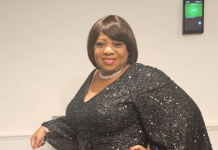“I like everything about working as a nurse. At work I feel at home. I’m just proud of what I do, which is helping people through difficult times in their lives.”
You’ve published many books but what differentiates each book from the other and do they follow the same theme?
Many authors start by writing their autobiographies. I love reading and writing stories about my life, and the lives of others. My first books were autobiographical. My second book is about the love story of my colleague and friend. I also wrote a book about the Lithuanian community in the West Midlands since the Second World War, and another book is about Lithuanian writers living and working in the United Kingdom.
What is your writing process like – do you have a routine or does it change with each book?
The routine is simple. If it’s an autobiographical book, I write it every day. Whenever I have ideas I write them down in my notebook. My phone is always with me, so sometimes I write down notes in an app. If I write about other authors or a community, it takes a lot of time, because it involves interviews, working with libraries, archives, etc.
Growing up in Lithuania, did you always want to work in the medical field?
 I have wanted to work in medicine since I was a child. I was always a doctor when I played with my dolls. My grandmother had sores on her legs, and her nurse made bandages. I dreamed of growing up to become a nurse and heal my grandmother.
I have wanted to work in medicine since I was a child. I was always a doctor when I played with my dolls. My grandmother had sores on her legs, and her nurse made bandages. I dreamed of growing up to become a nurse and heal my grandmother.
Did you experience a culture shock after moving from Lithuania to the UK in 2005?
Yes, I did. The mentalities of English and Lithuanian people are very different.
I travelled to England for the first time on 23rd August 2005, arriving alone at London’s Stansted Airport. As I mingled with the people in the crowded airport and listened to them speaking, I felt like I’d been hit over the head.
“Is this really England?” I thought. “What language are they speaking? This is not the language that I learned!” This was my first impression of the various dialects around me; I seemed to be swamped in a sea of foreign-speaking people. Luckily, at the airport’s information office I was able to communicate in English, and I understood what I was told.
The good news was that in England at that time (at least in the Southport area), you could do all of your grocery shopping for just £15 a week. In the Asda supermarket, I could buy goods at a low price. I wondered why Lithuania was not like this.
With a lot of free time on my hands, I walked around the town in order to get acquainted with the British way of living. Many things surprised me. For one, I saw many people walking around the streets in their work uniforms. There were people dressed as sales assistants and bar staff, as well as nurses. In England, it seemed that no one changed from their uniforms into their normal clothes when they left work.
What did you do as a nurse in Lithuania?
I was a matron in a rehabilitation centre. I was working in an established company that organised training for nurses.
Did you enjoy working there, and how does nursing in Lithuania differentiate from nursing in the UK?
Yes, I enjoyed working there. For the most part, the medical and healthcare sectors in Lithuania are the same as anywhere in the world. There were differences with how healthcare works in the UK. But I can’t say too much now because I haven’t worked in Lithuania for 17 years. I am sure that a lot has changed.
What are some things you enjoy and dislike about being a nurse?

I like everything about working as a nurse. At work I feel at home. I’m just proud of what I do, which is helping people through difficult times in their lives. It makes me happy to see my patients heal.
In your book ‘It’s Hard to be an Angel’ you have a collection of real situations and stories from your life as well as advice for people that take care of bedridden people. How has this helped people?
In this book, everyone will find a story that speaks to them. People write to me and ask me to tell them more about a certain incident or story all the time.
As a result of working in a nursing home for over 15 years, you are now writing another book about you and your colleagues’ experiences in the UK. What will stand out in this book from the others?
This book is a collection of my experiences caring for people with disabilities. There are stories about my patients, and tips for caring for a patient at home. It is written as a conversation with the reader.
Why did you start a helpline for the Lithuanian community in Wolverhampton and after chairing the enterprise for 12 years, and why did you leave?
 When I came to live in England in 2005, there weren’t many Lithuanians. British society is very different from that in Lithuania. I needed help but didn’t know where to ask for it because I wasn’t very confident speaking English. I graduated from college, started communicating with other communities, and decided to establish a Lithuanian community by creating a small “island”, away from our homeland, where we used to meet and help people to resolve any issues they had. I introduced other people to the Lithuanian culture.
When I came to live in England in 2005, there weren’t many Lithuanians. British society is very different from that in Lithuania. I needed help but didn’t know where to ask for it because I wasn’t very confident speaking English. I graduated from college, started communicating with other communities, and decided to establish a Lithuanian community by creating a small “island”, away from our homeland, where we used to meet and help people to resolve any issues they had. I introduced other people to the Lithuanian culture.
I stopped running the helpline for the Lithuanian community when I started to focus on other ventures.
What is special about your company, Albion Art Club?
We organise art, literary and musical projects. Our next project is an online magazine, called the East-West Literary Portal. Here we publish works by authors from various countries in Europe. We translate them into English and organise presentations with authors. We do events and concerts, with both professional musicians and students. We also have drawing competitions for children, “The best illustration for a book”.















